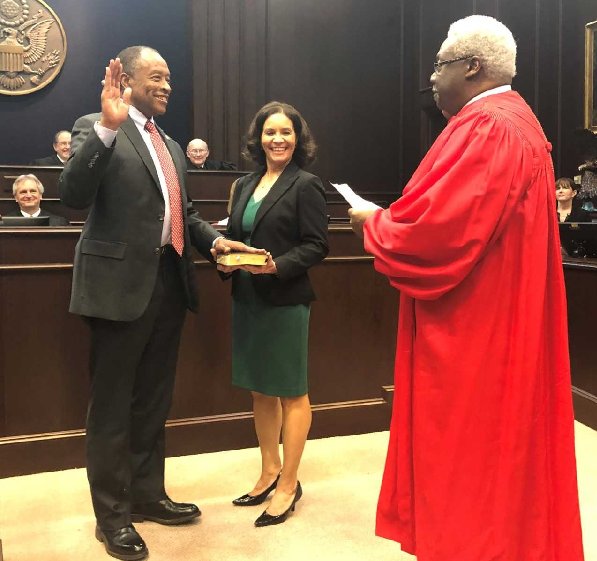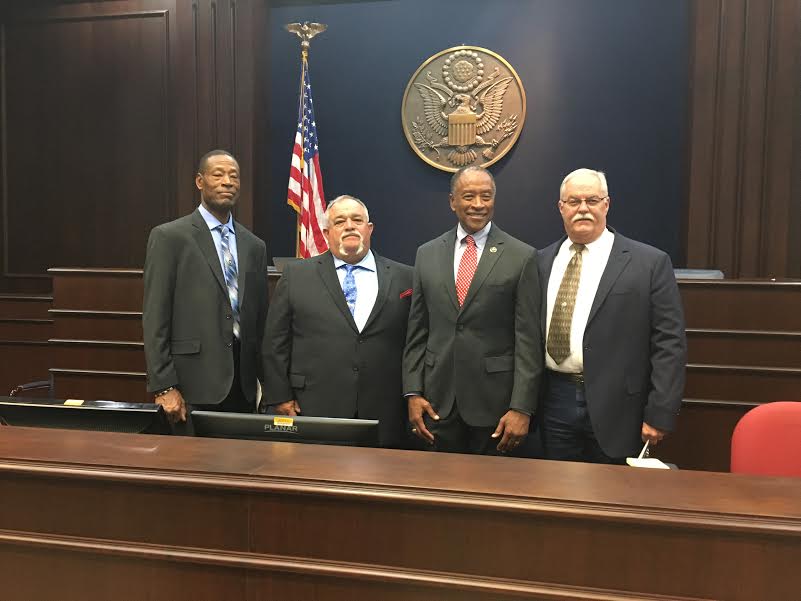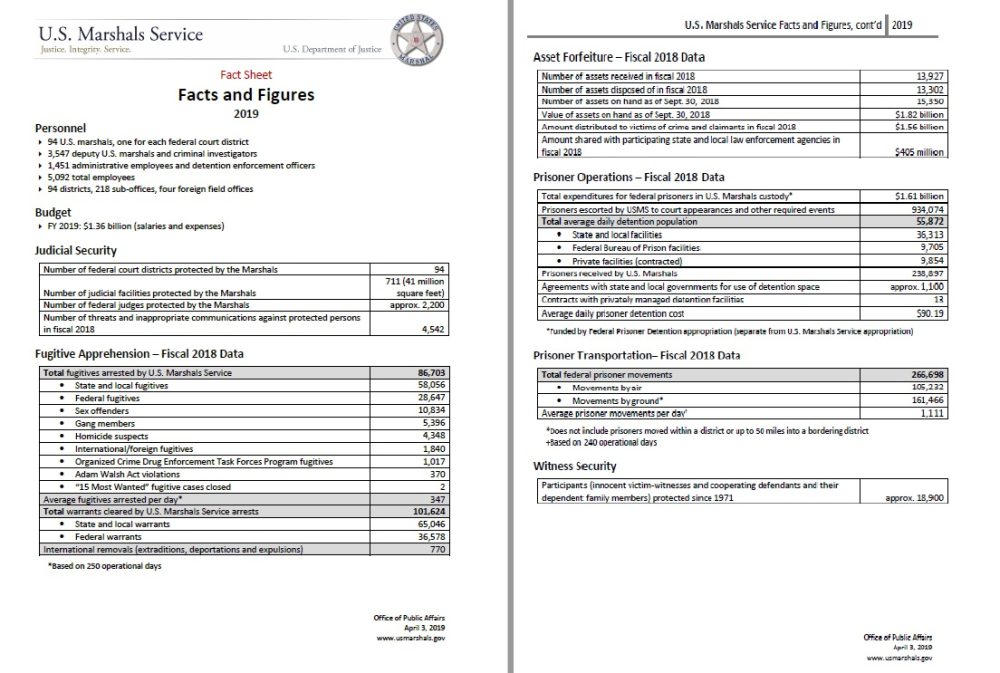Part 2
Donald Washington is scheduled to be recognized April 11 in a special ceremonial installation service in Washington as the new director of the US Marshals Service.
The new director of the U.S. Marshals Service, during a recent visit with family in Sulphur Springs, stopped by KSST radio on his way back to Lafayette to pack for the move to Washington. He toured the station, talked about the career which has helped prepare him for this new appointment, the Marshals Service and his family and Sulphur Springs, which he still thinks of as “home.”

Donald Washington being sworn in as the director of the U.S. Marshals Service in a March 29 ceremony at the Tom Stagg U.S. District Court in Shreveport, Louisiana, with Chief Judge S. Maurice Hicks Jr. presiding and Chief Judge Carl E. Stewart of the 5th U.S. Circuit Court of Appeals administering the oath of office.
CAREER
Instead of going into law enforcement like his younger brothers, Donald Washington chose to serve his country in a different capacity. He graduated from Sulphur Springs High School in 1973, and went to West Point.
“I went off to school, for boys at the time. I was senior when we added girls. That was an interesting experience. I went of to the military,” Washington said.
After graduating from West Point in 1977, Washington served in the U.S. Army and U.S. Army Reserve until 1987.
In 1989, he received his Juris Doctor from South Texas College of Law in Houston, and worked as an attorney for Conoco Inc.
“I became a practicing engineer and lawyer. At one time, I did apply to the FBI. I got accepted. Then, I had a conversation with Barry. Barry at that time was a state trooper. He said you know Donald, we have a law enforcement officer in the family, we don’t have a lawyer in the family. So, I ended up continuing to practice law as a result of that sage advice,” Washington laughed.
His career took him to Louisiana, where he’s lived and worked as an attorney since 1993. He was appointed by President George W. Bush in 2001 to served as U.S. Attorney for Western Louisiana, a position he held until his return to private practice in 2010 in Lafayette, Louisiana.
He has also served on several U.S. Attorney General’s Advisory Committees, as well as subcommittees on Civil Rights, Controlled Substances, and Native American Issues; and served as the Chairman of the Southeastern U.S. Organized Crime Drug Enforcement Task Force.
While heading up that region of Organized Crime Drug Task Force for a couple of years, Washington participated in Operation Choke Point
“The idea was that after 9/11 we the government had been highly successful in shutting down the access by drug traffickers to rail, air and sea. But we hadn’t done all that good of a job with cars and buses. So I thought the southeastern region — that went up to the Carolinas and down to Texas, excluded Florida, included all the states there and all the districts -I thought we would do that,” Washington said.
He said the Bush Administration saw the drug trafficking as business, and focused on ways to take away their capital, to have a bigger impact.
“We believe that we were pretty successful at it because, in that regard, we also created this list called CPOT List – Critical Priority Operational Target List – the world’s biggest drug trafficking organizations: in Afghanistan, Russia, South America, the United States. We began to pick them off one by one. El Chapo was the probably the latest and probably most notable that was on the list for a long time,” Washington explained.
Unfortunately, that lead to a leadership vacuum which spawned fighting, which spilled over into communities, according to Washington.
“You help them get equipped, trained and attitude appropriately. US attorneys and federal agents, DEA, FBI, US Marshals worked toward whatever functions they were involved in. in doing that,” Washington said.

US MARSHALS
The Sulphur Springs native was nominated by President Donald Trump on Oct. 2, 2018, to lead the U.S. Marshals, a nomination that was confirmed by the U.S. Senate on March 14, with family and friends from Texas in attendance.
Washington was sworn in March 29 as the director of the U.S. Marshals Service in a ceremony at the Tom Stagg U.S. District Court in Shreveport, Louisiana.
“We are thrilled to have Director Washington return to the Department. He brings a wealth of experience as a former U.S. Attorney and lawyer in various private and corporate capacities. We look forward to formally welcoming him to the U.S. Marshals Service at a ceremony April 11th,” U.S. Attorney General William Barr was quoted on the U.S. Marshals Service website following the March 29 swearing-in.
The US Marshals Service is one of four law enforcement agencies in the Department of Justice; the FBI, DEA and ATF are the other three.
“Marshals serve at the pleasure of the President. I really admire and I like this president. I think he’s got a lot of guts, doing some of the tings he’s attempting to do. I’m going to do my best to certainly not let him down in carrying out the law enforcement mission over at the marshals service. Of course, we’ll be at his service. At the end of the day, the marshals service is an executive agency,” Washington said.
The service has four primary missions: to protect federal judges, staff and facilities from any threats; leadership in a number of task forces; prison and inmate transportation; and witness protection. They also help lend resources to help find missing children, and felon apprehension, including internationally wanted people, according to Washington.
He anticipated being sworn in by the US Attorney General, then attending a number of briefings to become better acquainted with the operation.
“I have a tone of briefings on the various aspects of running the marshals service, what we’re into, where the issues are. At least one senator wants to see some action regarding whistle-blowers, that type of thing. We have our work cutout,” Washington said.
He plans to travel to meet with the various marshals and deputy marshals.
“I plan to be very hands on, try to get out and see,” Washington said.







